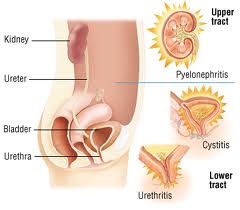[su_divider top=”no” style=”double” divider_color=”#952524″ link_color=”#952524″ size=”2″ margin=”10″]
What is UTI ( Urinary Tract Infection )? How to manage it? What are the precautions to be taken? What are the signs and symptoms? What is the cause of this disease? How to treat it? How can homeopathy help you? All of this answered, in this post and of course our doctors always there to help you. Just fill in your details in the form down below and we will answer all your questions for FREE!
[su_divider top=”no” style=”double” divider_color=”#952524″ link_color=”#952524″ size=”2″ margin=”10″]
[sc name=”query”]

WHAT IS UTI (urinary tract infection)?
• It is the infection of the parts of the urinary tracts such as:
-kidneys,
-ureters,
-urinary bladder,
-urethra.
• The infection in the upper urinary tract generally affects the kidneys known as pyelonephritis.
• But mainly the lower urinary tract infection is very common.
• The infection of the urethra known as urethritis.
• The infection of the bladder known as cystitis.
Which sex and age group are more affected due to UTI?
• Females are more affected due to UTI.
• Mainly the age of 20 to 40 years of women is more affected.
• Males are rarely affected due to this.
What causes urinary tract infection?
• The bacteria Escherichia-coli is the main causative factor.
• Sexually transmitted diseases also cause the infection.
• Gonorrhea and Herpes simplex can also cause urethritis.
What are the risk factors?
• History of the patient.
• Unhygienic condition.
• Spinal cord injuries or other nerve damage around the bladder also causes this.
• Females who are sexually active.
• Catheterization – patients requiring catheters have an increased risk.
• Menopausal age.
• If patients suffering from diabetes
• enlarged prostate.
What bacteria is found in a UTI?
• Escherichia coli, or E. coli, is responsible for UTI. About 80% of cases are seen due to the presence of E. COLI in the urine.
• Other bacteria which are responsible for this is:
• Staphylococcus saprophyticus,
• Pseudomonas aeruginosa,
• Klebsiella pneumonia.
What are the different types of UTI infections?
The different types of UTI are:
• The infection of the urethra known as urethritis.
• The infection of the bladder known as cystitis.
• The infection of the kidneys known as pyelonephritis.
What is the sign and symptoms of urinary tract infection?
• Cloudy, bloody urine, with a foul or strong odor.
• Pain while urination burning to feel during urination.
• lower abdominal pain, heaviness, vaginal discharge.
In case of men having complaints of:
• pus discharge from penis, dysuria, the frequency of urine increased.
• low-grade fever.
• Nausea and vomiting.
• Discomfort
How to investigate UTI?
• History of the patient.
• The family history of the patient.
• CBC (Complete blood count).
• Urinalysis
• Urine culture helps to identify the bacteria in the urine.
• IVP (intravenous pyelogram)
• Blood culture
• Cystoscopy
What are the complications?
• recurrent infections.
• formation of abscesses.
• Dehydration.
• Kidney damage
• sepsis (blood infection).
• In case of pregnant females premature delivery and this results in low birth weight for the infant.
How to prevent and manage the UTI?
• Drink plenty of water.
• Drink cranberry juice.
• Avoid potentially irritating feminine products.
• Avoiding the urge to urinate.
• Urinate after sexual intercourse.
• Maintain good hygiene.
• Increase the intake of Vitamin C in the diet.
• Consuming yogurt.
• Avoiding tea, coffee, alcohol, spicy food.
How to treat?
The antibiotics are usually recommended in this case.
Can homeopathy help in this case?
Yes, homeopathy can help in this case. There are so many medicines in UTI condition. Some of the homeopathic medicines which are helpful in this case. These are:
• Cantharis
• Apis mellifica
• Mercurius Corrosivus
• Pulsatilla
• Staphysagria
• Lycopodium
For more information, you can visit MayoClinic and HealthLine.
UTI (Urinary Tract Infection)
[su_divider divider_color=”#952524″ link_color=”#952524″ size=”2″ margin=”10″]
[sc name=”know-your-doctor”]
[sc name=”more-links-diseases”]
